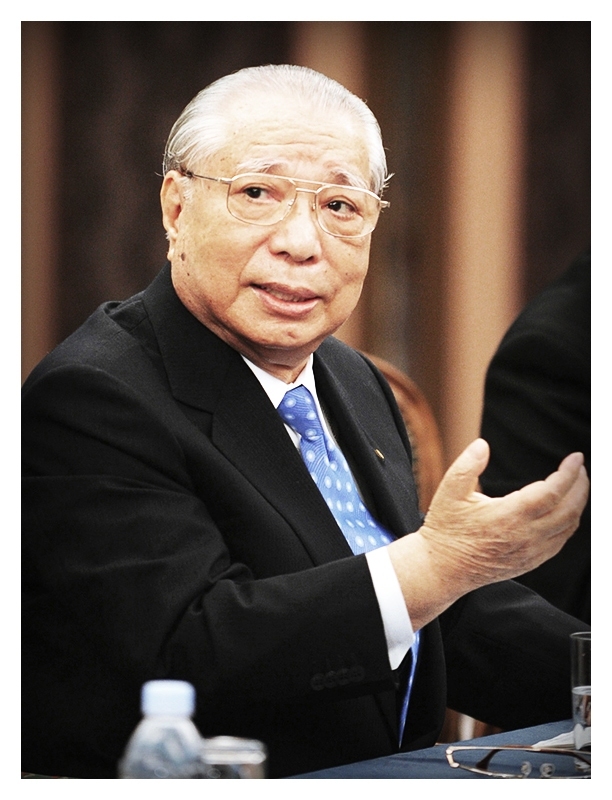Daisaku Ikeda’s Life Summary
Ikeda was born in Tokyo, Japan, on January 2, 1928, the fifth of eight children, to a family of seaweed farmers. The devastation and senseless horror he witnessed as a teenager during World War II gave birth to a lifelong passion to work for peace, rooting out the fundamental causes of human conflict.
For much of his early life Ikeda struggled against ill health, nearly succumbing, in his teens, to the ravages of tuberculosis, one of the leading killer diseases at the time. In 1947, at the age of 19, he met Josei Toda (1900-58), educator and leader of the Soka Gakkai lay Buddhist society whose activities were based on the philosophy of the thirteenth-century Buddhist teacher and reformer Nichiren. Ikeda found in Toda an open and unaffected person, a man of unshakable conviction with a gift for explaining profound Buddhist concepts in logical, accessible terms. He soon found employment at one of Toda’s companies and later completed his education under the tutelage of Toda, who became his mentor in life.
In May 1960, two years after Toda’s death, Ikeda, then 32, succeeded him as president of the Soka Gakkai. Under his leadership, the movement began an era of innovation and expansion, becoming actively engaged in cultural and educational endeavors worldwide. Ikeda has dedicated himself to fulfilling Toda’s dreams by developing initiatives in the areas of peace, culture and education.
Daisaku Ikeda
In 1975, Ikeda became the first president of the Soka Gakkai International (SGI), now a global network linking over 12 million members in some 190 countries and territories.
The central tenet of Ikeda’s thought, and of Buddhism, is the fundamental sanctity of life, a value which Ikeda sees as the key to lasting peace and human happiness. In his view, global peace relies ultimately on a self-directed transformation within the life of the individual, rather than on societal or structural reforms alone. This idea is expressed most succinctly in a passage in his best-known work, The Human Revolution, Ikeda’s novelization of the Soka Gakkai’s history and ideals: “A great inner revolution in just a single individual will help achieve a change in the destiny of a nation and, further, will enable a change in the destiny of all humankind.”1
Ikeda has two sons, Hiromasa and Takahiro, and lives in Tokyo with his wife, Kaneko.
[ The texts in the Profile section were developed by Anthony George, editor for the SGI Quarterly ].
Daisaku Ikeda is a Buddhist philosopher, peacebuilder, educator, author and poet. He is the third president of the Soka Gakkai lay Buddhist organization and the founding president of the Soka Gakkai International (SGI), which is today one of the world’s largest and most diverse lay Buddhist organizations, promoting a philosophy of character development and social engagement for peace.
Ikeda is founder of the Soka (value-creation) schools, a nondenominational school system based on an ideal of fostering each student’s unique creative potential and cultivating an ethic of peace, social contribution and global consciousness. The school system runs from kindergarten through graduate study and includes a university in Tokyo, Japan, and another in California, USA.
Ikeda is a staunch proponent of dialogue as the foundation of peace. Since the 1970s he has pursued dialogue with a wide range of individuals around the world in political, cultural, educational and academic fields. Over 70 of these have been published in book form, with people such as Mikhail Gorbachev, Elise Boulding, Joseph Rotblat and André Malraux.
In furtherance of his vision of fostering dialogue and solidarity for peace, Ikeda has founded a number of independent, nonprofit research institutes that develop cross-cultural, interdisciplinary collaboration on diverse issues: the Boston Research Center for the 21st Century (renamed the Ikeda Center for Peace, Learning, and Dialogue in 2009), the Toda Institute for Global Peace and Policy Research and the Institute of Oriental Philosophy. The Min-On Concert Association and the Tokyo Fuji Art Museum promote mutual understanding and friendship between different national cultures through the arts.
Ikeda is a prolific writer who has published more than 150 works, ranging from Buddhist philosophy to biographical essays, poetry, children’s stories and photographic collections.

